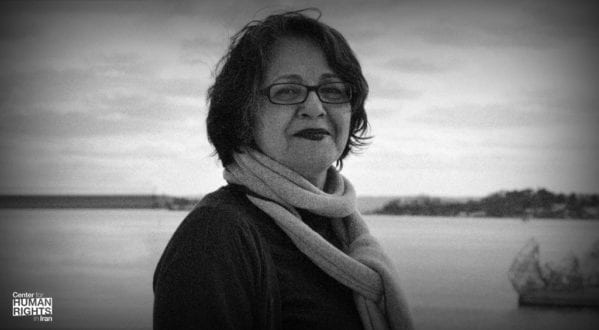CHRI – Except for one short phone call, 66-year-old German-Iranian dual national Nahid Taghavi has not been heard from since her arrest by security agents in Tehran on October 19, 2020.
The retired architect has been held in solitary confinement in Evin Prison without any reason being given for her plight, the Center for Human Rights in Iran (CHRI) has learned.
“After 39 days of uninterrupted detention, the authorities have still not given any explanation of why she was arrested,” Taghavi’s daughter, Mariam Claren, said in an interview with CHRI on November 23, 2020.
“We are just waiting for the prison authorities to give us some news about my mother.”
Taghavi’s daughter added: “They gave my mother permission to contact us (by phone) for a brief moment 12 days after she was arrested. Other than that, we have had no news.”
“My uncles [Taghavi’s brothers] have made inquiries at Evin Prison numerous times but received no answer from the authorities. Every time they say, ‘Don’t bother coming here because we will not give you any explanation until the interrogations are over.’”
Family Worried Taghavi Has No Access to Her Medication
The biggest concern now is Taghavi’s medical condition. Her arrest took place two days after she underwent dental surgery and she has a history of high blood pressure.
“What we are worried about most is my mother’s health,” Claren told CHRI from her home in Germany. “The least we ask is that my mother have access her to her pills and be able to have visits.”
Iran has a history of denying prisoners needed medical care, especially political prisoners and dual nationals.
“Our primary demand is that my mother should be freed as soon as possible. However, given that the judicial system is unfair, our minimum request at the moment is to receive information about my mother’s physical condition and health, as well as the details of her case,” she said.
Taghavi’s daughter said the family is insisting on having their own lawyer follow up on the case—not lawyers appointed by the judiciary. (In cases involving alleged national security related charges, detainees must choose their attorney from a list of state-approved lawyers.)
German Foreign Ministry Warns Dual Citizens Against Travel to Iran
Meanwhile, Claren said the German authorities have not provided any information either.
“The German government is aware of this case but the officials have not given me any specific information,” Claren told CHRI.
“All they are saying is that they are collecting information about the case. They say they cannot do anything because Iran does not recognize dual citizenship.”
On November 23, in response to Taghavi’s prolonged detention, the Germany foreign ministry warned dual citizens against traveling to Iran.
“There have been several arrests of German-Iranian dual nationals in the past—including most recently in October 2020, often without comprehensible reasons,” said the German foreign ministry in an online update of its travel warning.
“Further detentions of people who also possess Iranian citizenship cannot be ruled out,” it added, stressing therefore that “unnecessary travel by people who are also Iranian nationals is strongly discouraged.”
Claren added, “I hope the international community will raise its voice and take a stand so that my mother will be freed soon.”
Second Detained German-Iranian Dual National Also Refused Consular Access
Earlier, security agents arrested another German-Iranian identified as Jamshid Sharmahd, the alleged leader of a pro-monarchy militant group known as Tondar, which is accused of masterminding the bombing inside a mosque which killed 14 people and wounded 215 in Shiraz, south central Iran, in 2008.
However, his family in California insists he was only a spokesman for the group and had nothing to do with any attacks in Iran.
The German Embassy in Tehran sought consular access, hoping to get details but “Iran doesn’t allow consular access for its dual nationals, considering them exclusively Iranian citizens,” the Associated Press reported on August 4.
Iranian prosecutors have used manufactured “national security” charges to imprison a number of Iranian dual nationals in recent years. Iran’s government says it does not recognize dual nationality but continues to trade dual nationals in prisoner swap deals.
Read this article in Persian
 Shabtabnews In this dark night, I have lost my way – Arise from a corner, oh you the star of guidance.
Shabtabnews In this dark night, I have lost my way – Arise from a corner, oh you the star of guidance.



